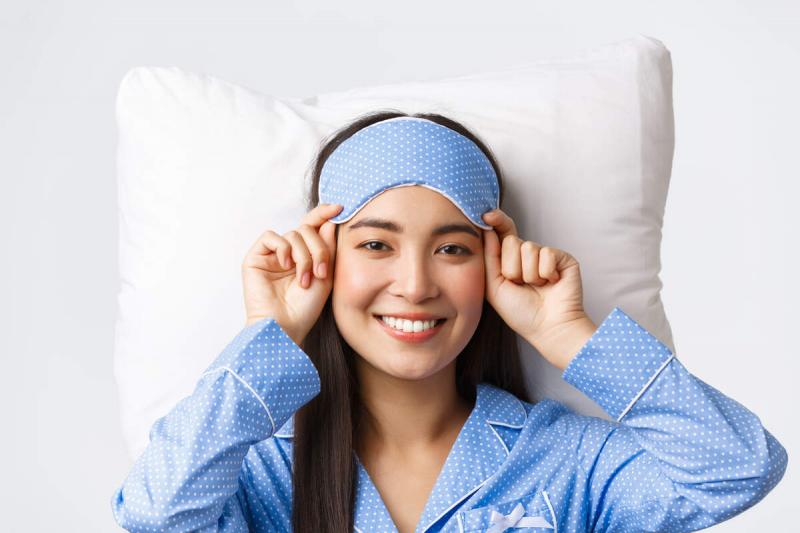How Sleep & Eye Health are Connected?
Are you getting enough sleep? It's a question you must’ve often heard for a good reason. Sleep is crucial for your overall health and well-being. However, there's a deeper connection between your sleep and your eye health. It's an interesting topic that has caught the attention of researchers and eye care professionals alike.

Whether you struggle with getting enough shut-eye or simply want to know how to rest your eyes, this post is here to help you. It explores the link between your quality of sleep and your eye health and gives you some practical tips on how to get a good night’s sleep. So let’s dive in!
What is the Connection Between Lack of Sleep and Eye Health?
Did you know that just like your brains and bodies, your eyes also heal themselves while you sleep? Thus, not getting enough shut-eye can cause issues like dryness, itchiness, bloodshot eyes, and other problems.
As a matter of fact, over time, sleep deprivation could even lead to more severe eye diseases like glaucoma. So, ensure you catch those Z's and give your eyes the rest they need! More details are coming up in the next section!
How is Sleep Helpful for Improving Eye Health?
Getting enough sleep can do wonders for your eye health. There are 4 key ways in which sleep can improve your eyesight. Let's take a closer look at each of them.
- Boosts the Eye Immunity Your immune system fights against harmful bacteria and viruses that can cause infections. The eyes are no exception to this. Lack of sleep can weaken your immune system, making you more susceptible to eye infections such as conjunctivitis or pink eye. Getting enough sleep helps to boost the immune system, thereby protecting the eyes from infections.
- Reduces the Risks of Dry Eye A dry eye is a common problem when your eyes don't make enough tears. It causes a lot of uncomfortable symptoms like irritation and vision issues. Not getting enough sleep can make it worse! That's because when you are sleep-deprived, your tear production slows down. But if you catch enough zzz's, your eyes produce enough tears and stay hydrated.
- Helps in Avoiding Glaucoma Glaucoma is a serious eye condition that damages the optic nerve, leading to blindness. But do you know sleep apnea and eye health are also interconnected in this context? Dry eyes and glaucoma can be the result of reduced oxygen and blood flow to the optic nerve due to sleep disorders such as sleep apnea. Thus, getting a sound sleep naturally prevents the chances of glaucoma in future.
- Reduces the Chances of Accidents Due to Sleep Deprivation Sleep deprivation can lead to fatigue, drowsiness, and impaired vision, increasing the risks of accidents and injuries. This is especially true for those who drive or operate heavy machinery. Getting enough sleep helps to reduce the chances of accidents due to sleep deprivation, as it improves alertness and concentration.
How to Relax Your Eyes & Get a Good Sleep at Night?
If you are struggling to get a good night's sleep, there are a few things you can try:
- Firstly, make sure your sleeping environment is cool enough to help you sleep more comfortably.
- Next, try to stick to a regular sleep schedule, even on weekends. This will help your body establish a routine and regulate your energy levels.
- Avoid eating within three hours of bedtime. Digestion can require a lot of energy, making it harder to drift off and stay asleep.
- Make sure your bedroom is as dark as possible. Even the tiniest bit of light can disturb your sleep.
- About an hour before bed, start dimming the lights in your home. This will signal your body and mind that it's time to relax and wind down.
- If you live in a noisy area, try sleeping with a fan or some white noise to help you fall asleep without distractions.
- Avoid using your smartphone, laptop, TV, or tablet at least two hours before bed to ensure you get enough melatonin, a chemical that helps you sleep.
- Regular exercise can also help you sleep better. But make sure to work out earlier in the day and not within three hours of bedtime.
- If nothing works, it may be worth consulting with your doctor. They can help you determine if you have a condition like sleep apnea that could impact your rest.
You now know the vital link between the quality of your sleep and the health of your eyes. Poor sleep can lead to a number of vision problems. But don't worry! From establishing a bedtime routine to creating a sleep-conducive environment, there are many strategies, as mentioned here, that you can use to get a good night's rest.
So take care of your eyes, prioritize your sleep, and don’t forget your annual eye exam to catch any eye condition early on – your body will thank you!

